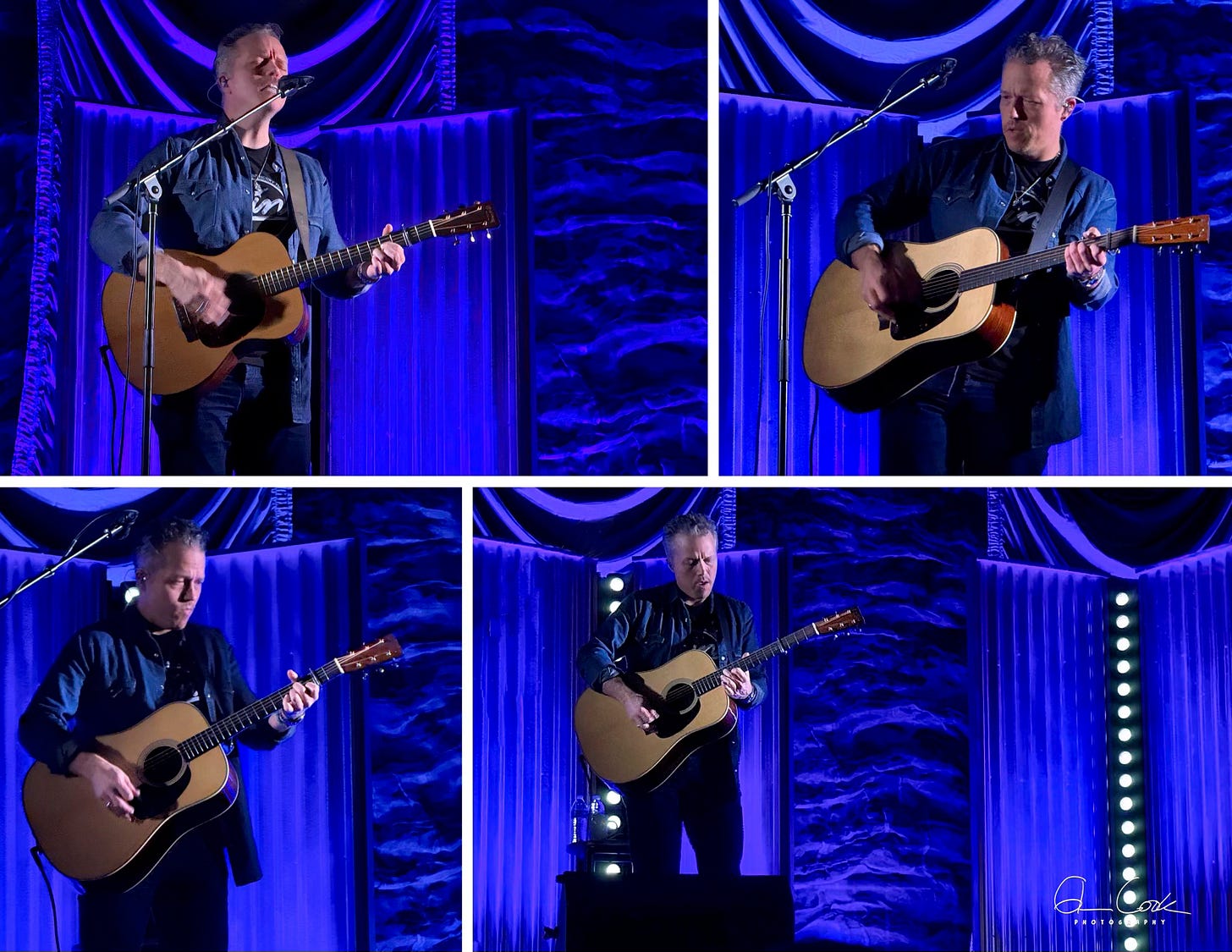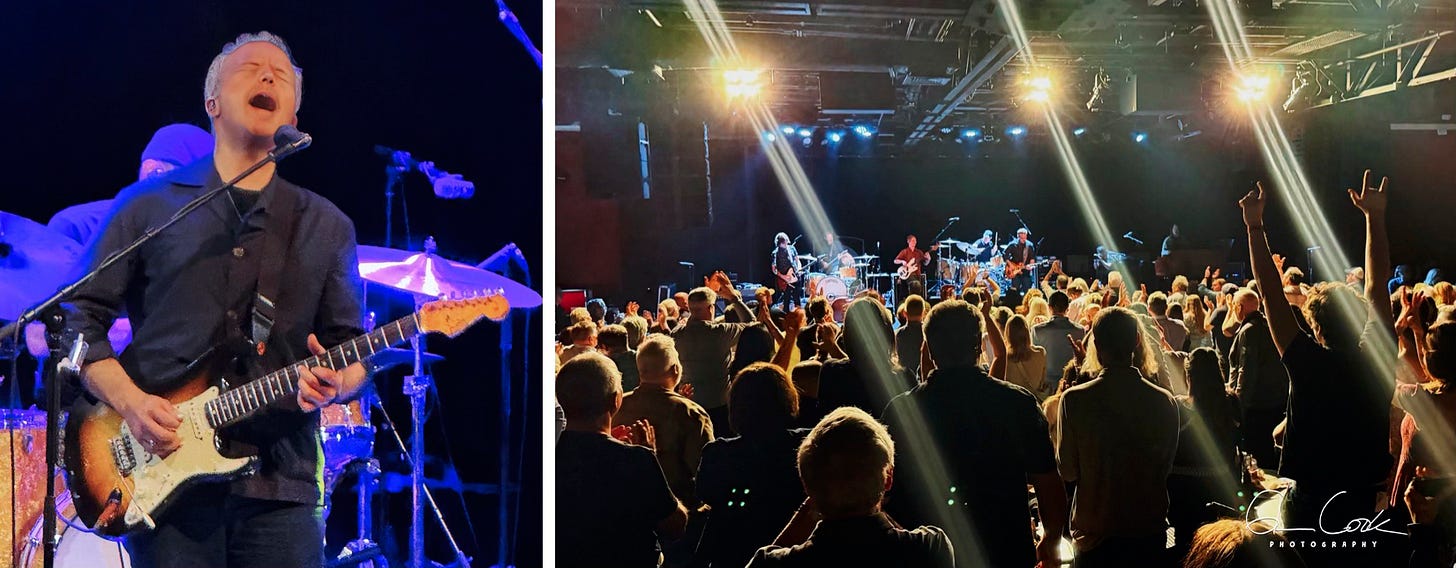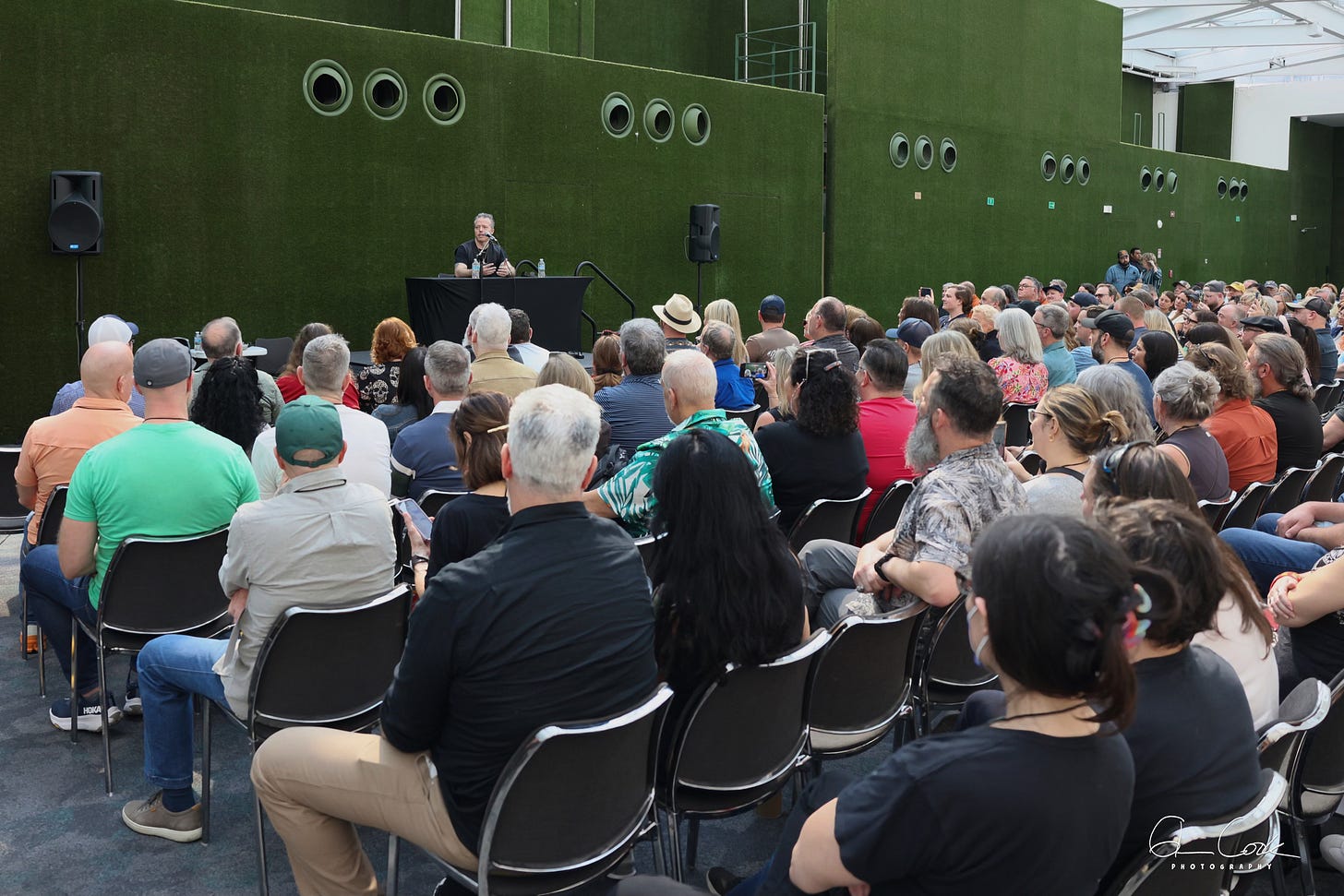Jason Isbell: Answering Questions
Grammy winner talks about songwriting, sobriety and growing up in the South at fan gathering in Mexico City
Ron Patterson stood in line, surrounded by more than 300 people in the ballroom of a Mexico City hotel, and patiently waited to ask Jason Isbell his question. When Patterson’s turn came midway through the fan session with the Grammy Award-winning singer-songwriter, the Austin, Texas, resident cut to the chase.
“As a Black male who is Southern born and raised, I’ve been moved by your ability to embrace your Southern heritage while not shying away from the dark side of parts of that history,” Patterson said. “Is that from your years of travel … or is it something else that you can share?”
Isbell, who grew up in Alabama’s Muscle Shoals region and still lives in the Nashville area when he’s not touring, paused for a second before launching into the one of the longest answers of the session. His response resonated with me deeply.
“The place that you're born, you’re kind of stuck with that,” Isbell said. “Being from the Deep South is going to be a significant part of the way people see you and the way you interact with people for the rest of your life. You can't ever completely get rid of the accent. I'm stuck with that, and I think a lot of us are stuck with that.”
Isbell, who performed “Something More Than Free” at last fall’s Democratic National Convention and duetted with REM’s Michael Stipe at a Kamala Harris event in the days prior to the election, said he was fortunate to be raised in a family that did not “prejudge based on skin color or finances or what part of town you lived in.” That said, he admitted family members “had some backward Southernisms that, as I got into my teens, we argued a lot about.” The difference, he noted, was that “more often than not, they would listen to me.”
“I remember getting into some arguments with my parents and grandparents about things that had to do with race or gender or whatever,” he said. “Honestly, eventually they would go, ‘Alright. You know what? You're right. I've been thinking about this wrong for all these years.’
“I realized at that point how I was just so lucky.”

Diversity and Duality
The Q&A was part of “Super Ocho,” a four-day fan gathering run by Dreamcatcher Events that also included two concerts with Isbell — one with his longtime band, The 400 Unit, and a reunited Centromatic in a 600-seat venue, as well a private solo show for the 340 attendees. (Ironically, he did not perform “Super 8,” a long time fan favorite, at either show.)
The 35-minute question and answer session was held in a controlled environment, with questions submitted in advance and winnowed down in the interest of time.
One person asked about Isbell’s favorite place to perform; not surprisingly, it’s the Ryman Auditorium, where he has an annual residency. He talked about his relationship with Centromatic’s Will Johnson, who now is a member of the 400 Unit, his obsession with early Jackson Browne albums, and the “all groove” of his longtime drummer, Chad Gamble. He also was blunt about continuing to find diverse, lesser-known groups to serve as his opening acts.
“In a perfect world, those acts wouldn’t be available to me. … I wish it wasn’t that way,” he said. “I wish they were all getting what I feel like they deserve. If they’re white and male, then they’ve moved on to playing bigger venues. That’s how the system works, unfortunately.”
In addition to questions about songwriting, the most interesting responses to me from Isbell revolved around faith, grace, and dealing with — to quote his former Drive by Truckers bandmate— the “duality of the Southern thing.”
“I write about the things that continue to affect me and the things that keep coming back up in my mind, and one of those things is growing up in the South,” Isbell said, continuing his response to Patterson’s question. “It has the musical legacy that I'm so grateful for, especially coming from Muscle Shoals, where I got an incredible education in what I consider to be the best kind of music anybody ever made.”
Isbell said many of the friends he still interacts with from the Muscle Shoals area “are not getting along with their parents right now for a whole lot of very obvious reasons.”
“I got really fortunate that way, but also there are a lot of kids who didn't think the same way that I did and, you know, were really pretty shitty about it. So that's still in there and I'm still writing about it.
“Something that interests me is this idea that why can't we all just zoom back a little bit and say this place is not perfect,” he said, gesturing with his hands. “This place is good. These things are good. These things are perfect, but these other things have been doing a lot of damage for a long time.”
The Songwriter’s Lessons
The reason I was at the Q&A was my wife Jill had surprised me with the January 16-20 trip for my 60th birthday. It was a (more than) fitting gift, considering I’ve long thought Isbell is the best songwriter working today. His writing is a simple yet complex canvas of hope and regret, both personal and societal, that he pens with devastating insight and rigorous honesty.
Responding to a question about the mechanics of songwriting, Isbell said the “lightning in a bottle thing doesn’t happen very often.” He said he takes a “bunch of notes,” adding, “Don’t ever go by that bullshit where people say, ‘if the line’s good, you’ll remember it in the morning.’ You won’t. You will not. As you get older you will forget everything. Write it down.
“As I’ve gotten better at writing songs, I’ve gotten better at writing songs that I don’t like,” Isbell said. “Judging the quality of the work that you’re doing will slow you down so much. You have to trust the fact that you have time later to go back and edit and fix it. If I had to sit down and write a song right now for all of you, I wouldn’t like the first draft much at all, but it would be complete.”
Most songs require two or three drafts before he is satisfied. “You can’t judge it early or you’ll never get it finished,” he said. “Like Neil Young said, ‘People don’t want to hear a song that you like. They want to hear a song that you wrote.’ Now Neil Young sometimes writes songs that I think he means for me to not like at all, and I have huge respect for him for that, but I can’t do that. I can’t be like, ‘All right, I’m really going to piss them off with this one’.”
On the subject of faith and grace in his writing, he alluded again to his upbringing: “The word faith itself, especially where I grew up, means one very specific thing. But for me, faith is kind of like hope with a little bit of evidence, and I think that’s extremely important. If you’re looking at it from a religious perspective, all the religions are based on the same on the same essential thing … the golden rule or some version of it. Treat others the way you would want to be treated.”
He then pointed to a lesson he had gotten from reading Tom T. Hall’s The Songwriter’s Handbook.
“For a song to work, you have to have that sort of perspective,” Isbell said. “[Hall] talked about how you can be angry, but if you’re bitter, then you reduce the effectiveness of a songwriter’s perspective. You can be emotional, but it’s hard to trust somebody who’s bitter, maudIin, and judgmental of a person rather than an individual action. If you’re going to sell a song to somebody, you need them to trust you.”
‘Elephant’ and Finding Time
Isbell’s career has been on a steady climb since he got sober more than a decade ago and released 2013’s“Southeastern,” a mostly solo album that is on Rolling Stone’s top 500 all-time list. At every show, he plays the album’s “Cover Me Up,” drawing cheers from the crowd with the line, “I swore off that stuff, forever this time.”
One question was about the devastating “Elephant,” a centerpiece of “Southeastern” that deals with the illness and impending death of a close friend. The person asked about the origin of the line, “Surrounded by her family, I saw she was dying alone.”
With “Elephant,” Isbell said he intentionally focused on aspects people have trouble discussing when they are about to lose a loved one. “That’s something that doesn’t get talked about a whole lot, or it didn’t to me at the time,” he said of a song written 14 years ago. “I just tried to put myself in that place.”
Isbell said the line came from an interview with a hospice nurse on a “This American Life” podcast, “one of three or four that were out at the time.” The nurse talked about family members going through the stages of the grieving process before the person in the bed actually passes away.
“I think that happens a lot,” he said. “And like everything else, it’s a complication and it’s a gift. But it stuck with me. I thought, ‘You really come in and go out by yourself,’ and everyone else’s response to that is very separate from your response to transitioning to whatever is next.”

Asked how sobriety has changed his experience as an artist, Isbell responded, “I gained a lot of time.” He said drinking had become a never-ending cycle in an effort to escape memories and the things that troubled him. “As soon as the sun would start to go down, I would think, ‘Alright, time to go drink, so I can sleep tonight and get up and have a full day of drinking tomorrow.’ And that interrupted the person that I was and the work that I was doing.
“I discovered that the inspiration was never important. What I was writing about didn’t really matter a lot of times. What mattered was that I served the work with my time and my effort,” he said. “Once I got sober, I was able to really sit in a chair for a long time, and that’s how ‘Southeastern’ happened and then everything that’s happened after that.”
Accountability and Clarity
Staying sober, he said, forces you to “actually take accountability for your own actions, your own behavior, and stop blaming everybody else.”
“I don't think it's the case with everybody,” he said. “I know some people who go out on the weekends and get hammered and write great songs all week. But for me, that wasn't an option. I needed to be clear, and I needed the time. Before I got sober, I thought, ‘Well, people just don’t understand the music I’m making because it’s not poppy enough. I’m not dumbing it down for everybody.’ And then I got sober and thought maybe I could do a better job. Maybe the problem was that I wasn’t working hard enough.”
Now, the clarity that sobriety brings allows him to sit with his thoughts and deal with them in creative rather than destructive ways.
“There's a version of yourself that's just all your worst fears, your worst memories, your regrets, and everything that you love, and everything that excites you, and everything that you celebrate,” he said. “You have to sit across the table with that guy for long enough to carve it and mold it into a song or a sculpture or painting or whatever.
“When I was drinking, I could not stay in that seat across the table from that person. I couldn't look him in the eye, and I couldn't sit there long enough to make something out of what the two of us had experienced together. Once I got sober, it was like, ‘Alright, here we are. Let's stay here until it's done’.”









Excellent reminder of this Q&A! I realize now that I've been waiting for a recap of this and I appreciate that you captured it so well!
What an insightful dude. Thank you for sharing this!